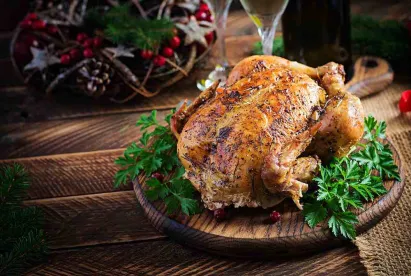With Thanksgiving fast approaching, you have probably heard that there is a turkey shortage1 – brought about by a combination of rising costs for feed and fuel, continued labor shortages, and – if that were not enough –a virulent strain of avian flu decimating turkey flocks across the U.S.
Although industries across the board have felt the effects of supply chain disruptions brought on by the COVID-19 pandemic, the meat and poultry industry has been particularly hard-hit. So much so that the Biden Administration, in concert with the United States Department of Agriculture (USDA), has moved forward with regulatory actions aimed at easing the supply bottleneck. Whether they will have the intended effect remains to be seen.
In July 2021, President Biden signed an Executive Order on Promoting Competition in the American Economy (the Executive Order).2 The Executive Order directs 72 different actions across the federal government, including several rulemaking directives to the USDA aimed at increasing competition within the meat and poultry industry. Among other things, the Executive Order directs the USDA to issue new rules defining when meat can bear “Product of USA” labels, to address perceived loopholes in the current rules, and to issue new rules under the Packers and Stockyards Act. Following the Executive Order, the USDA has made progress on these new rules, and recently announced new initiatives to ramp up antitrust enforcement in the meat industry.
(For more on this Executive Order and its implications across industries, see a prior article from our Foley colleagues, President Biden’s Executive Order on Competition Could Mean Broad Changes Across a Range of Industries.)
Modernizing the Packers and Stockyards Act
The Packers and Stockyards Act (PSA), enacted in 1921, is a federal law designed to combat labor abuses by meatpackers and processors. Specifically, the PSA makes it illegal for livestock and poultry producers to engage in any unfair, unjustly discriminatory, or deceptive practice,3 or to give any undue or unreasonable preference or advantage to any person or locality.4 Congress explicitly intended the protections in the PSA to be broader than those found in other federal statutes, such as the Sherman Antitrust Act.5 However, the USDA believes the force of the PSA has been reduced by a combination of regulatory narrowing, budget and administrative cuts, and under-enforcement in previous decades. For that reason, the USDA announced three rulemaking actions designed to address livestock and poultry markets as they exist today so the PSA fulfills Congress’s goal to protect livestock producers and poultry growers.
The first proposed rule, released in draft form on June 7, 2022,6 is intended to promote transparency in poultry production contracting by revising the list of disclosures and information live poultry dealers must furnish to poultry growers and sellers with whom the dealers contract. The proposed rule establishes additional disclosure requirements in connection with the use of poultry grower ranking systems by live poultry dealers to determine settlement payments for poultry growers.
The second proposed rule, released in draft form on October 3, 2022,7 identifies retaliatory practices taken by regulated entities – which the PSA defines as swine contractors, live poultry dealers, or packers – that interfere with lawful communications, assertions of rights, and participation in associations (among other protected activities), as “unjust discrimination.” The proposed rule also identifies unlawfully deceptive practices with respect to contract formation, performance, termination, and refusal. Specifically, USDA proposes to:
-
Prohibit, as “undue prejudices,” disadvantages and other adverse actions against “market vulnerable” individuals who are deemed to be at heightened risk of adversely differential treatment in relevant markets;
-
Prohibit, as “unjust discrimination,” retaliatory and adverse actions that interfere with lawful communications, assertions of rights, associational participation, and other protected activities;
-
Prohibit, as deceptive practices, regulated entities employing pretexts, false or misleading statements, or omissions of material facts, in contract formation, performance, termination, and refusal; and
-
Require recordkeeping to support USDA monitoring, evaluation, and enforcement of compliance with aspects of the rule.
The USDA is presently seeking comments on this proposed rule, with the rulemaking docket open for comment until December 2, 2022. Following the comment period, the third potential rule, which has not yet been released, will focus on certain unfair practices and undue preferences. In addition, the third rule will explain whether and when a showing of harm to competition is—or is not—required under sections 202(a) and (b) of the PSA.
Increased Focus on Antitrust Enforcement
A recurring theme underlying the USDA’s recent rulemaking efforts is a perception that existing federal laws aimed at protecting farmers, ranchers, and other agricultural producers have been under-enforced. Earlier in 2022, the USDA and the U.S. Department of Justice (DOJ) jointly expressed a shared commitment to enforcing “federal competition laws that protect farmers, ranchers, and other agricultural producers and growers from unfair and anticompetitive practices."8 One notable component of this agency cooperation is a new USDA website, www.farmerfairness.gov, which allows anyone to report complaints of potential violations of antitrust laws and the PSA. In addition, the website incorporates existing PSA confidentiality and whistleblower protections against retaliation for those who report criminal antitrust concerns.
In September 2022, the USDA also announced the availability of $15 million in funding to encourage state Attorneys General (AGs) to partner with the USDA on competition issues in the food and agricultural space. The USDA expects to engage state AGs through a combination of renewable cooperation agreements and memoranda of understanding aimed at improving state AGs’ ability to conduct on-the-ground investigations of competition issues. The USDA says it will work directly with state AG offices to solicit applications for funding.
These recent agency efforts come on the heels of multiple civil lawsuits alleging price-fixing and other anticompetitive practices by producers across the beef, pork, and poultry industries.
Conclusion: Will the Turkey Shortage Affect Your Thanksgiving?
It is too early to say whether the USDA’s recent efforts to address competition in the meat and poultry industry will result in lower prices – in part because the effects of the COVID-19 pandemic (e.g., labor shortages, shipping disruptions, and higher prices for inputs like fuel and animal feed) still linger. However, as national and global supply chains begin to return to pre-pandemic operations, consumers can hope for a less expensive turkey on the dinner table by next Thanksgiving.
FOOTNOTES
1 https://www.nytimes.com/2022/10/21/dining/thanksgiving-turkeys-cost-inflation-supply-chain.html
2 Executive Order 14036, Promoting Competition in America’s Economy, 86 Fed Reg. 36987, July 9, 2021.
3 7 U.S.C. § 192(a).
4 7 U.S.C. § 192(b).
5 See, e.g., Wilson & Co. v. Benson, 286 F.2d 891, 895 (7th Cir. 1961).
6 Docket No. AMS-FTPP-21-0044.
7 Docket No. AMS-FTPP-21-0045.





 />i
/>i

